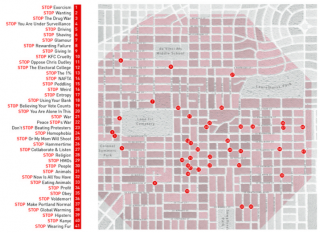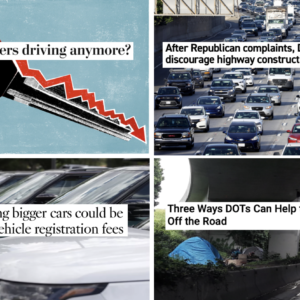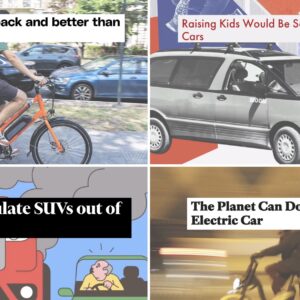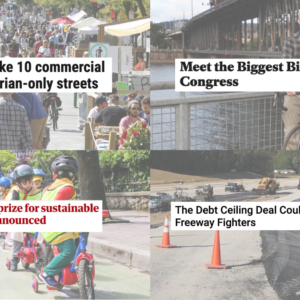
(Image: Portlandness: a Cultural Atlas of Portland)
Here are the bike-related links from around the world that caught our eyes this week:
“Stop” signs: A new book of creative Portland maps includes a comprehensive directory of everything Southeast Portland’s traffic-sign graffiti artists don’t want you to do.
City liable: A California city will pay $5.8 million because a judge said “narrow bike lanes and lack of streetlights” contributed to an alleged drunk driver’s fatal rear-ending of a man on a bike.
Short commutes: Why did rich people return to central cities? A new paper theorizes that the rapid decline of rich people’s leisure time has reduced their tolerance for long commutes.
Collective freight: Gothenberg, Sweden, has created a service that pools freight deliveries to small city-center businesses with shared delivery vehicles, making its downtown safer, quieter and cleaner.
Speed cameras: Chicago Mayor Rahm Emanuel has sold them as ways to enforce school zones, but that’s undermined the city’s ability to use them elsewhere.
Walking currency: People can “mine” a new Bitcoin-style digital currency not through computer processing cycles but through steps logged on a smartphone app.
Athlete mechanics: The San Francisco 49ers teamed up with a pro cycling team to personally build 50 bikes for middle schoolers.
Advertisement
Death and life: For the record, you are almost certainly going to die when your circulatory or resperatory systems fail, not when terrorists attack you.
Street empathy: The hardest thing to do while getting around the city by bike, car or foot might be to see things from another modal point of view.
Solar bike path: One year after opening, the much-shared Dutch concept has generated a “0.0057 percent return on investment.”
Nepal race: Yak Attack, the highest bike race on Earth, finished its first run since the country’s massive earthquake last spring.
Paid commute: The Italian city of Massarosa is the latest to see what happens when the government offers to pay you to bike to work.
More cars: A new report estimates that without decongestion pricing, self-driving cars will increase U.S. vehicle miles traveled by 30 percent, in part because they’ll automobilize children and seniors who currently don’t drive.
Cheap gas: The last year’s rising driving rates and street fatalities have proved what the previous decade did: people respond to prices.
If you come across a noteworthy story, send it in via email, Tweet @bikeportland, or whatever else and we’ll consider adding it to next Monday’s roundup.
— Michael Andersen, (503) 333-7824 – michael@bikeportland.org







Thanks for reading.
BikePortland has served this community with independent community journalism since 2005. We rely on subscriptions from readers like you to survive. Your financial support is vital in keeping this valuable resource alive and well.
Please subscribe today to strengthen and expand our work.
That article on Chicago speed cameras appears to be behind a paywall; but it’s analogous to what Portland did with sharrows.
Not it’s not. It’s Chicago, so assume that article is how the contract for the cameras was given to a close friend or family member of the Mayor’s and the profics from the citations are being used in some corrupt way. It’s literally impossible to have a political career in Chicago without being crooked.
And its almost literally impossible to have a political career in Portland without being a Wussy.
Is this a sexist comment or just a partisan political slam?
Besides, I wasn’t talking about corruption in government, I was talking about devaluing useful traffic control tools.
I voted TWICE for a very handsome black man, HOPING, and PRAYING he would bring some Chi-town corruption to D.C.! Ha!
The article is behind a registration wall, but not a pay wall.
Read it for a good example of how ingrained in many people the right to dangerously speed is, and how the messy compromises in laws end up in stories about those compromises not being perfectly implemented.
Related press in Chicago demonstrates how reporters don’t understand traffic crash reporting by police (having a premise of the article about cameras in areas having few speed-related crashes) and then including: “Experts interviewed cautioned against relying too heavily on police reports to assess whether crashes truly involve speed, even though they acknowledge there is no other measure available. They say police showing up after the fact are often unable to determine the cause.” i.e. “Your article’s premise is bogus.”
Sigh.
Re: cheap gas; in 2008 it seemed like the price per gallon went up the closer we got to the election. I smelled an implied threat in that from the oil racketeers, that if we elected the wrong person President they would get mad at us. Be interesting to see what happens next year if there is a chance of either Hilary Clinton or Bernie Sanders becoming #45.
Back then the US was able to manipulate the supply chain better, but today it may be a little different due to OPEC having responded to the ‘American Threat’ by flooding the market with oil (pardon the pun). But you’re right… it will be interesting to see how it plays out. The money is definitely in play:
http://www.sacbee.com/news/investigations/the-public-eye/article9261986.html
http://www.sacbee.com/news/politics-government/capitol-alert/article45406533.html
Bad link on the Indian Wells, CA story about the drunk driver killing a cyclist and costing the city $5.8 Million. Here’s one that works: http://www.desertsun.com/story/news/crime_courts/2015/11/17/indian-wells-ordered-pay-6m-cyclists-death/75932988/
Thanks for this. It sets an interesting precedent – what if Weiss was properly lit and bicycling in the center of the W3 lane, having deemed the sub-standard “bike lane” a hazard to his safety? Like many other stories I read, the situation seems to help reinforce the misunderstanding that the only place bicycle riders are allowed to travel on roadways is within marked bike lanes.
Thanks – fixed.
Street empathy: The hardest thing to do while getting around the city by bike, car or foot might be to see things from another modal point of view.
A classic example of media false equivalence.
One transportation mode kills over a million people a year directly, many tens of millions indirectly, and is a major contributor to the ongoing 6th mass extinction. Drivers have run roughshod over people and our shared environment for generations. I’m completely disinterested in seeing things from this point of view.
Bravo, sir!
“I’m completely disinterested in seeing things from this point of view.”
So you’re saying it’s really hard to have empathy.
Well, I can’t speak for soren, but I see no more need to develop empathy for the automobile driver’s point of view than for the One Percent’s – no more need than the mouse for the dinosaur. They don’t need my empathy, they will take the power no matter what, and my job is to understand them as a hazard and threat, and stay out of their way.
I read the article with the hopes of finding empathy, though I think I already have that as both a longtime driver and bicyclist. What I found instead was a hackneyed piece lacking either a point or a call to action.
“Cars, in short, are status symbols. Just as owning a bike conveys autonomy upon a ten-year-old…”
“Walking is a human ability; driving is an urban right. Bicycling is neither.”
“And bicyclists have a new argument on their side: moral rectitude, with its corresponding sense of entitlement. Who are you, they ask, to be driving a clunker and killing the environment? I am making the morally superior choice when I get on my bike;”
It would be one thing to actually learn something from these viewpoints, but instead it just disappoints me that the New Yorker chooses to publish this trite rambling.
Hope the 49’ers can assemble bikes better than they play football lately.
Don’t get me started…
https://www.facebook.com/Stop-the-Illegal-Closures-of-San-Tomas-Aquino-Creek-Trail-409055265915305/
I loved the article about bike delivery systems in Gothenburg. There is a food warehouse down in Eugene called Hummingbird Wholesale that makes its local deliveries with a couple of recumbent cargo trikes with electric-assist cargo trailers, all covered, of course. (It’s an interesting company that has been helping grass seed farmers change over to growing food by guaranteeing to purchase their production at a price that is profitable. They also give a 5% discount at their retail shop for people who come by bicycle.)
I’ve also enjoyed seeing UPS get into the spirit by using bicycles for their high-volume December delivery season. They use their delivery vans to bring packages to storage lockers in neighborhoods or right to the bikes and then the bikes take it from there.
With all these cities built around railroad tracks, I wonder if we will eventually have freight travelling by rail to its destination city and then being off-loaded to travel the last few miles on e-cargo bikes. I can dream, can’t I?
My favorite stop sign reconfiguration is: “Stop the Tickle Monster.” Don’t remember where it was though.
I would expect US health insurance companies to jump on board with the BitWalking thing. With the huge number of preventable, expensive deaths involving sedentary lifestyle disease, it seems like a no-brainer to reduce their costs by encouraging their clients to move a bit.
Generally speaking, scofflaw motorists (I know, redundant) discourage people from cycling. I love the efforts of Massarosa to use the revenue from traffic fines to pay people to ride their bikes. It’s sort of a counterweight to the effects of bad driving.
5.8 Million to cyclist: Love this piece of quoted misinformation that was obviously not checked by the reporter: But if the roadway had been built with the 15- or 16-foot lanes that it was supposed to have under the law, then he would have never been in the car’s path, and
First off, there is no “law” that “requires” a 15-16 foot lane. Possibly a 14 lane would be the “standard”…maybe. They do have quite wide roads in California presumably for farm equipment.
Anyhow…that whole article is terrible. The real reason why that cyclist was killed was due to the bike lane going missing. The city should have cut a lane out (gasp!) and put in a big bike lane/shoulder. But they didn’t..and now they have to pay. Too bad someone had to pay with their life.
I have no sympathy with the city.